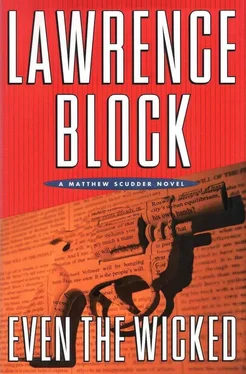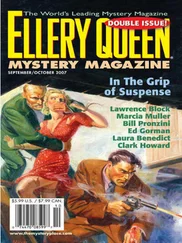S: And you went into the kitchen...
M: Yeah.
S: And got the knife?
M: And got the knife, yeah. And stabbed him in the back. I thought, teach you to turn your back on me, you little fuck. I thought, you stabbed me in the back, now we’re even. Who knows what I thought? I was too drunk for whatever I thought to make much sense.
S: You washed the knife.
M: I washed the knife, and do me a big favor and don’t ask me why. If I was worried about prints all I had to do was wipe it, right? But I washed it, and then I put the paperweight in my pocket and took it home with me. And then I went to bed.
S: And you remembered everything when you woke up?
M: Everything. You used to have blackouts?
S: Lots of them.
M: I never had one in my life. I remembered every fucking thing. The only thing, I tried to tell myself maybe I dreamed it. But the fucking paperweight’s sitting on the bedside table, so it’s no dream. I killed him. Can you believe it?
S: I guess I have to.
M: Yeah, and so do I. I killed a human being because he gave my play a bad review fifteen years ago. I can’t fucking believe it. But I believe it.
“You like irony,” I told Ray Gruliow. “Maybe you’ll like this. I suspected Marty early on. Matter of fact, I suspected him long before he did anything.”
“That’s irony, all right,” he said. “I’d recognize it anywhere. And we even talked about it at the time. You ran a check on Marty, made sure he was otherwise occupied when a couple of Will’s victims qualified for last rites.”
“Patsy Salerno and Roswell Berry. He couldn’t have killed either of them, but before I established as much I had this scenario spinning in my mind. He writes the original column, just pouring out his very real feelings about Richie Vollmer.”
“And Richie calls up and says he’s not really such a bad guy, and Marty arranges to meet him, sucker-punches him, and strings him up.”
“Seems farfetched,” I said.
“Oh?”
“What struck me as a little more plausible was that some public-spirited citizen read Marty’s column and got inspired.”
“And wrote Marty a letter, and then did a number on Richie.”
“Yes to the second part,” I said. “But no to the first. The way I figured it, all the Will letters were Marty’s. He wrote the original column and thought that was the end of it. Then Richie turned up hanging from a tree limb. Then Marty saw a way to make a big story a whole lot bigger. He invented Will and wrote two letters, one he pretended to have received before Richie’s murder, expressing agreement with the column, and one he sent himself afterward, taking credit for it.”
“Just to make a better story out of it,” he said. “And position himself as a key player.”
“Without any intention of taking it any further. But it’s a hell of a story.”
“Bigger than Bosnia.”
“Well, closer to home. You get a story like that, you don’t want to let it die. You already wrote two Will letters and nobody looked at you cross-eyed, so you write one more and threaten somebody you figure the city could live without.”
“Patsy Salerno, for example.”
“Right. But Marty was miles away making a speech when Patsy was killed, so that took a farfetched theory and made it impossible. I thought up a few variations on the theme. Maybe Marty wrote the letters, and whoever had killed Richie was equally obliging when it came to knocking off the rest of the people on the list. I didn’t think that could work, and the Omaha business exploded it.”
“What do you mean?”
“The letter writer knew Roswell Berry had been stabbed before he got the coat hanger treatment. And that was something only the killer would have known, and Marty was in New York when it happened.”
“And then Adrian died.”
“Adrian died,” I agreed, “and Adrian turned out to be Will, and that made the story bigger than ever, so big that Marty couldn’t bear to see it die out. And he got the idea of writing a letter. Why not? He was a writer.”
“Did you ever let him know you’d checked him out?”
I had to think. “No,” I said. “Why?”
“Then you don’t have to worry that you put the idea into his head.”
“Never occurred to me. I wasn’t the only one who had checked him out early on. The cops made sure he was clean, and he must have known they investigated him. But I don’t think anything or anybody gave him the idea of picking up where Adrian left off. I’d say it was something he couldn’t help thinking of.”
“And no one was going to suspect him, because they’d already ruled him out. Both you and the cops.”
“Uh-huh.”
“And it was just an innocent hoax at first, with no murderous intent. Until he got caught up in his own bullshit.”
“You sound like his lawyer.”
“No,” Ray said, “and God forbid. I’ve got enough guilty clients at the moment.” He talked about one of them, one who was actually likely to be able to pay him a fee for a change, and then he said, “I understand you’re going to be coming into a few dollars yourself.”
“It looks that way.”
“The way I heard it, Leopold’s beneficiary is giving you a third.”
“That’s what she says. She could change her mind once she’s got the money in her hand. People do.”
“You think she will?”
“No,” I said. “I think she’ll follow through.”
“Well, I hope to God you won’t let your conscience get in the way.”
“It’s a lot of money,” I said.
“You earned it, for Christ’s sake. Not just in terms of the results you produced but the time you put in. Look at the months you’ve been working on this, and what did you get in return? A two-thousand-dollar retainer from Adrian?”
“So?”
“You probably spent that and more on expenses.”
“Not quite.”
“Don’t quibble,” he said. “Just take the money.”
“I intend to.”
“Well, that’s a relief.”
“I usually take money when it’s offered,” I said. “It’s how I was brought up. And this is money I can take with a reasonably clear conscience. And I can use it. Christmas is coming.”
“So they tell me,” he said, “but you must have done your Christmas shopping by now.”
“Not quite all of it,” I said.
The week before Christmas was about as social as it gets for us. We were out just about every night. We had dinner one evening with Jim and Beverly Faber, and another night with Elaine’s friend Monica and her married boyfriend. (Monica, according to Elaine, figures if a guy’s not married there must be something wrong with him.)
One afternoon we stopped in at a reception at Chance Coulter’s art gallery on upper Madison Avenue, then had dinner with Ray Gruliow and his wife. We ended the night at Danny Boy Bell’s table at a new cellar jazz club in the west nineties, listening to a young man who’d listened a lot to Coltrane when he wasn’t listening to Sonny Rollins. The following afternoon Mick called to say someone had given him a good pair of seats for the Knicks game, and could Elaine and I use them? Elaine, who feels about basketball the way Mick feels about ballet, insisted that I go with Mick. We watched them lose to the Hornets in overtime, and she met the two of us afterward for dinner at Paris Green.
The night before Christmas we had dinner at home. She made pasta and a salad and we thought about having a fire in the fireplace and decided it was more trouble than it’s worth. Besides, she said, Santa might sue. During the evening the phone rang a few times, with the usual round of holiday greetings. One of the callers was Tom Havlicek, telling me I’d once again managed to miss the opening day of deer season. “Damn,” I said. “I’d marked it on my calendar, too.” He asked for an update on Havemeyer, and I filled him in and told him his fellow Ohioan had a good lawyer and would probably wind up with a relatively light sentence.
Читать дальше












